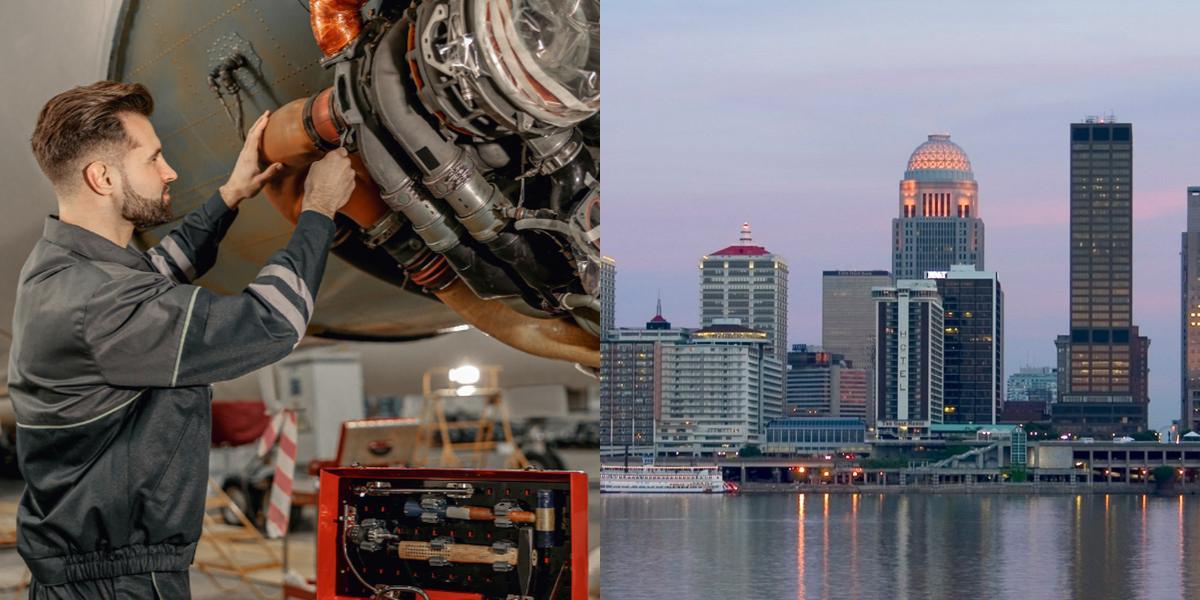How to Become an Aviation Mechanic in Kentucky

Want personalized recommendations?
Let's match you to the right program

Aviation mechanics are professionals who are responsible for ensuring the safety and proper functioning of aircraft. They perform maintenance, repairs, and inspections on various components of airplanes, including engines, electrical systems, and landing gear. Their main goal is to ensure that aircraft are in optimal condition and meet all safety regulations.
Article continues after recommendations
Recommended for you
Responsibilities of an Aviation Mechanic
Aviation mechanics have a wide range of responsibilities, including:
- Conducting regular inspections to identify and fix any potential issues or malfunctions.
- Troubleshooting and repairing mechanical and electrical problems.
- Performing maintenance tasks, such as changing oil, replacing filters, and inspecting brakes.
- Following detailed technical manuals and guidelines to ensure proper procedures are followed.
- Keeping accurate records of all maintenance and repairs performed.
- Testing aircraft systems after maintenance or repairs to ensure proper functionality.
Work Environment
Aviation mechanics can work in various settings, including:
- Airlines: Many aviation mechanics are employed by commercial airlines, where they work on a fleet of aircraft.
- Maintenance, Repair, and Overhaul (MRO) Facilities: These facilities specialize in providing maintenance and repair services for different types of aircraft.
- General Aviation: Some mechanics work in smaller airports and provide maintenance services for privately-owned planes.
- Military: Aviation mechanics can also work in the military, performing maintenance and repairs on military aircraft.
How to Become an Aviation Mechanic in Kentucky?
To become an aviation mechanic in Kentucky, one must first complete an approved aviation maintenance technician program, which provides the necessary education and hands-on training. Next, individuals must obtain the required certifications, such as the Airframe and Powerplant (A&P) license, to legally work as an aviation mechanic. With the proper qualifications, they can then search for job opportunities in the aviation industry and earn a competitive salary.
Requirements to Become an Aviation Mechanic in Kentucky
To become an aviation mechanic in Kentucky, you need to meet certain education and legal requirements. These requirements include:
-
Education: You must complete a Federal Aviation Administration (FAA) approved aviation maintenance technician program. These programs are offered by various vocational schools and community colleges and provide the necessary knowledge and skills to work as an aviation mechanic.
-
Legal Requirements: After completing the aviation maintenance technician program, you need to pass the FAA written, oral, and practical exams to obtain the Airframe and Powerplant (A&P) certification. This certification is required to work as an aviation mechanic and demonstrates your knowledge and competency in aircraft maintenance.
Exploring a Career in Aviation Mechanic Outside Kentucky
For anyone looking to become an Aviation Mechanic but is in a different state, your opportunity to work as an Aviation Mechanic might be found in Arkansas, Louisiana, New Jersey, Vermont, or Wyoming. Should these not be viable options, Dreambound eases the process of discovering and comparing Aviation Mechanic classes with a search by zip code. With the drive to succeed and the support of resources like Dreambound, anyone can forge a successful path in trade, construction, and industry, no matter where they are.
Get courses selected just for you
Try our powerful search engine
Article continues after recommendations
More recommendations for you
How do I get my Aviation Mechanic certification?
Becoming an aviation mechanic can be a rewarding and fulfilling career choice. Aviation mechanics are responsible for inspecting, repairing, and maintaining aircraft to ensure they are safe and in proper working order. If you have a passion for airplanes and are mechanically inclined, pursuing a career as an aviation mechanic may be the right path for you.
To become a certified aviation mechanic, there are a few steps you need to follow:
-
Education and Training: The first step to becoming an aviation mechanic is to obtain the necessary education and training. There are several options available, including attending a trade school, community college, or technical institute that offers aviation maintenance programs. These programs typically take 18 months to 2 years to complete and provide a comprehensive education in aircraft maintenance and repair.
-
Experience Requirements: In addition to formal education, most aviation mechanic certification programs require a certain amount of hands-on experience. This can be obtained through internships, apprenticeships, or on-the-job training. It is important to gain practical experience working on aircraft to develop the necessary skills and knowledge required for certification.
-
FAA Certification: The Federal Aviation Administration (FAA) is the governing body responsible for certifying aviation mechanics in the United States. Once you have completed the necessary education and training and gained the required experience, you can apply for FAA certification. The FAA offers several different types of certifications, including Airframe, Powerplant, and Airframe and Powerplant (A&P) combined.
-
Written and Practical Exams: To become certified, you must pass both a written and practical exam administered by the FAA. The written exam tests your knowledge of aviation maintenance topics, while the practical exam assesses your ability to perform maintenance and repair tasks on an actual aircraft. It is important to study and prepare for these exams to ensure success.
-
Continuing Education: Once you have obtained your aviation mechanic certification, it is important to stay up to date with the latest industry trends and advancements. The aviation industry is constantly evolving, and it is essential to continue learning and expanding your knowledge to remain competitive in the field. The FAA requires certified mechanics to complete regular training and education courses to maintain their certification.
By following these steps, you can obtain your aviation mechanic certification and begin your career in the field.
How do I get a job as an Aviation Mechanic?
Once you have obtained your aviation mechanic certification, the next step is to find a job in the field. Here are a few steps you can take to increase your chances of finding employment as an aviation mechanic:
-
Network: Networking is an essential part of finding a job in any industry, and aviation mechanics are no exception. Attend industry events, join professional organizations, and connect with others in the field to expand your network. Building relationships and making connections can lead to job opportunities and insider knowledge of available positions.
-
Apply to Aviation Companies: Research aviation companies in your area and apply for open positions. This can include airlines, aircraft maintenance and repair facilities, and aviation manufacturers. Be sure to tailor your resume and cover letter to highlight your relevant skills and experience. Emphasize any certifications, specializations, or additional training you have obtained.
-
Utilize Online Job Boards: There are several online job boards that specialize in aviation and aerospace careers. Create a profile on these platforms and upload your resume. Set up job alerts to receive notifications when new aviation mechanic positions become available. Some popular job boards for aviation mechanics include Aviation JobNet, AeroCareer, and JSfirm.
-
Consider Relocation: Depending on your location, there may be limited job opportunities for aviation mechanics. If you are struggling to find employment in your area, consider expanding your search to include other regions or even other countries. Be willing to relocate if necessary to increase your chances of finding a job.
-
Prepare for Interviews: Once you start receiving interview invitations, it is important to prepare and practice for the interviews. Research common interview questions for aviation mechanics and prepare thoughtful and concise answers. Dress professionally and bring copies of your resume and any relevant certifications or documentation. Be prepared to discuss your experience, skills, and why you are interested in the position.
By following these steps and being proactive in your job search, you can increase your chances of finding employment as an aviation mechanic.
Career Paths and Opportunities after Becoming an Aviation Mechanic
Becoming an aviation mechanic opens up a wide range of career paths and opportunities. Here are a few examples of potential career paths you can pursue after obtaining your aviation mechanic certification:
-
Aircraft Technician: As an aircraft technician, you will be responsible for inspecting, repairing, and maintaining aircraft. This can include working on various types of aircraft, such as commercial airplanes, helicopters, or private jets. Aircraft technicians often work for airlines, aircraft maintenance and repair facilities, or government organizations.
-
Avionics Technician: Avionics technicians specialize in the electrical systems and instrumentation of aircraft. They are responsible for installing, maintaining, and troubleshooting avionic systems, including communication and navigation equipment, radar systems, and autopilot systems. Avionics technicians often work for airlines, avionics manufacturers, or aviation maintenance and repair facilities.
-
Quality Control Inspector: Quality control inspectors are responsible for ensuring that aircraft maintenance and repair work meets regulatory standards and safety requirements. They inspect completed work, review maintenance records, and perform audits to ensure compliance with industry regulations. Quality control inspectors often work for airlines, maintenance and repair facilities, or government organizations.
-
Specialized Technician: Aviation mechanics can choose to specialize in a specific area of aircraft maintenance and repair. This can include areas such as engines, hydraulics, avionics, or sheet metal work. Specialized technicians often work for airlines, aircraft manufacturers, or specialized maintenance and repair facilities.
-
Supervisor or Manager: With experience and additional training, aviation mechanics can advance to supervisory or managerial positions. These roles involve overseeing a team of mechanics, managing maintenance operations, and ensuring compliance with industry regulations. Supervisors and managers often work for airlines, maintenance and repair facilities, or government organizations.
These are just a few examples of the career paths and opportunities available to aviation mechanics. The aviation industry is vast and diverse, offering a wide range of options for those with the necessary skills and qualifications.
Final Thoughts
Becoming an aviation mechanic requires dedication, training, and a passion for aircraft. By obtaining the necessary education and experience, and obtaining your FAA certification, you can enter into a rewarding career in aviation maintenance and repair. With a variety of career paths and opportunities available, the possibilities are endless for those who choose to pursue this field. So, if you have a love for airplanes and a desire to work with your hands, consider becoming an aviation mechanic and take the first step towards an exciting and fulfilling career.
Dreambound offers a window into various career paths, so if you're considering a shift in your career, browse through these articles:

Justine Tacmo is part of the Growth team at Dreambound. He assists the organization by updating critical information so students receive the most up-to-date information for their desired trade schools. Besides, he has a passion for writing and expresses it through poetry, covering themes of life, love, and mental health, which is also his advocacy.



